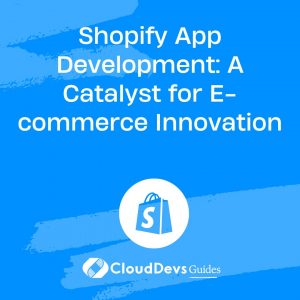Shopify App Development: A Catalyst for E-commerce Innovation
E-commerce is no longer a subsidiary channel for businesses; it is a primary and necessary mode of operation. With its constant evolution, businesses are in a continuous race to optimize their online platforms, hoping to provide a seamless user experience that will increase sales and customer loyalty. In the e-commerce universe, Shopify stands out as a robust platform that allows businesses to create their online stores with ease and finesse. The decision to hire Shopify developers can greatly augment this process, introducing an array of customized functionalities to the store.

What further enhances Shopify’s capabilities is its unique ecosystem of apps. Shopify developers are skilled at harnessing these tools, creating apps that can dramatically enhance the functionality of a Shopify store by customizing and optimizing various elements such as SEO, marketing, sales, social media integration, customer service, and more. Shopify App Development, thus, has become a key factor in building powerful e-commerce solutions. This is where hiring Shopify developers comes into play, offering professional insight and expertise to build effective apps tailored to your business needs.
In this post, we will explore the process and principles of building Shopify apps, with real-world examples to illustrate the potential of these tools. We will also delve into how hiring Shopify developers can help you tap into this potential and drive your online business to greater heights.
Understanding Shopify App Development
Before we dive into the examples, it’s crucial to understand what Shopify app development entails. Shopify apps are web applications that are integrated with the Shopify platform using APIs. These apps add specific functionalities to a Shopify store that are not available in the default platform. Developers can build public apps, private apps, or custom apps based on the requirements.
The development process usually involves the following steps:
- Setting Up: The first step involves setting up a development store and creating an app in the Shopify Partners Dashboard. This process provides you with API keys which are used to connect your app with Shopify.
- Building the App: This step involves coding the app using your preferred programming language. Shopify provides a robust API that you can use to interact with the platform.
- Testing the App: Before launching the app, thorough testing is carried out to ensure its functionality and compatibility with the Shopify platform.
- Deployment and Submission: The app is then deployed to a hosting server and submitted to the Shopify App Store for review. Once approved, it can be installed on any Shopify store.
Now that we have a basic understanding of Shopify app development let’s look at some examples of successful Shopify apps and how they have transformed e-commerce businesses.
Example 1: Klaviyo
Problem: E-commerce businesses need to engage their customers through targeted marketing campaigns. Traditional email marketing tools may not offer the required level of integration with Shopify, limiting the customization and targeting capabilities.
Solution: Klaviyo, a powerful email marketing app, solves this problem. With its deep integration with Shopify, it allows businesses to create personalized, automated email sequences based on customers’ shopping behavior.
App Development Insights: The Klaviyo team developed an app that uses Shopify’s APIs to fetch customer data and their interaction with the store. This data is then used to segment customers and design personalized email campaigns. The app is built to handle large volumes of data, making it suitable for both small and large businesses.
Example 2: SEO Booster
Problem: SEO is crucial for any online store to improve its visibility on search engines. However, optimizing a website for SEO can be complex and time-consuming.
Solution: The SEO Booster app is designed to automate the SEO process. It offers features like auto SEO scan, keyword suggestions, and SEO problem fixing, thereby improving the store’s search engine rankings.
App Development Insights: The SEO Booster team developed a comprehensive tool that integrates seamlessly with Shopify and uses its API to analyze and optimize store content. The app applies complex SEO principles in an automated manner, making it easy for store owners to enhance their website’s SEO without expert knowledge.
Example 3: ReCharge
Problem: Subscription models are popular in e-commerce but managing them can be complicated. Shopify does not have built-in functionality for handling recurring billing and subscription management.
Solution: ReCharge is a Shopify app designed specifically to add subscription functionality to Shopify stores. It allows businesses to sell products on a recurring basis, manage subscriptions, and offer flexible subscription options to customers.
App Development Insights: ReCharge uses the Shopify API to integrate its functionality into the store’s checkout process. It manages customer data and handles recurring billing seamlessly, thereby enhancing the customer’s shopping experience and increasing the store’s revenue potential.
Example 4: Loox
Problem: Customer reviews are a critical factor in driving more sales, but collecting and showcasing them in an appealing way can be challenging.
Solution: Loox is a Shopify app that automates the process of collecting and displaying product reviews. The app sends automated emails to customers asking for reviews, which are then displayed in attractive formats on the store.
App Development Insights: Loox uses the Shopify API to sync customer data, send automated emails, and display reviews on product pages. The app is designed to make it easy for store owners to increase customer trust and boost sales.
Conclusion
Shopify app development holds immense potential for adding value to online stores. The process involves understanding the pain points of e-commerce businesses and creating tailored solutions to address them. Whether you’re a business owner looking to enhance your Shopify store or considering hiring Shopify developers to create customized apps, understanding the process and potential of Shopify app development can open doors to endless possibilities.
By leveraging Shopify’s robust API and adhering to best practices in app development, businesses can create powerful and effective tools that significantly enhance the capabilities of a Shopify store. Hiring Shopify developers can thus be a game-changing decision for your e-commerce venture, giving you access to professional skills and knowledge necessary to implement complex app integrations seamlessly.
The examples shared in this post stand as a testament to the transformative power of Shopify apps in the e-commerce space. Remember, your journey towards a more efficient and lucrative e-commerce operation can begin with the simple decision to hire Shopify developers. Happy developing!
Table of Contents







